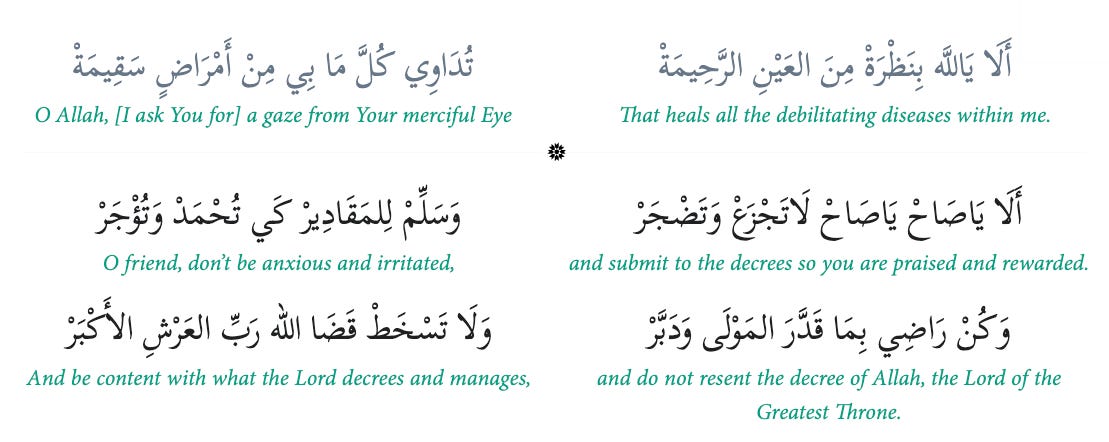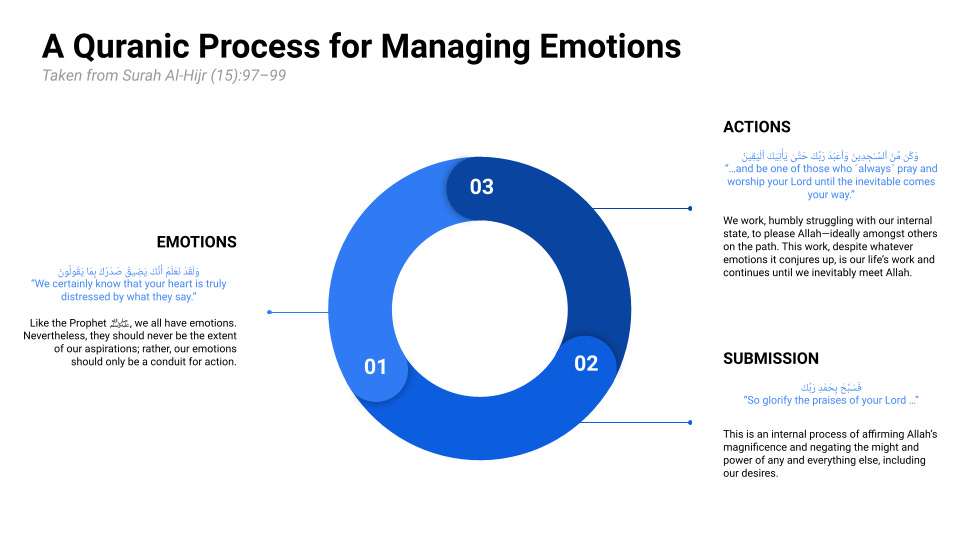Palestine + A Quranic Process for Managing Emotions
This article aims to take from the Quranic narrative of how Allah instructed the Prophet ﷺ to process his emotions with the hopes of providing guidance for our own lives.

We are living in extraordinary times. While news pundits argue over what amount of proportional response is appropriate for Israel after Hamas’s attack on October 7th, Israel is “attempting to commit, if not actively committing, the crime of genocide in the occupied Palestinian territory, and specifically against the Palestinian people in the Gaza Strip.”1 To make matters more difficult, we have a live feed to it all—from the death of noncombatant women and children to the carpet bombings of residential neighborhoods—and our hearts are heavy.
Extraordinary times call for extraordinary measures. As we try to process it all, we must ask ourselves: How did, and would, the Prophet ﷺ do when he was in a comparative situation? This article aims to take from the Quranic narrative of how Allah instructed the Prophet ﷺ to process his emotions with the hopes of providing guidance for our own lives.
Emotions
Before receiving revelation, Prophet Muhammad ﷺ was known as As-Saadiq Al-Amin (the truthful and trustworthy one). He was the person people knew they would leave their belongings with and who they trusted to adjudicate affairs fairly.2 But, as soon as his da’wa went public, everyone turned on him ﷺ, including his own family members.3 Despite continuously rejecting and abusing him ﷺ—they went on a PR campaign to malign his character, telling everyone who entered Makkah to ignore him, he is either a magician or crazy4—hearing their disbelief and mockery of Islam pained him greatly.5 He ﷺ had emotions and experienced grief just like us. The disbelieving Makkahs were not only his family and friends, but the Prophet ﷺ cared about their existential salvation. Allah told him, “We certainly know that your heart is truly distressed by what they say.”6
Sh. Yasir Fahmy pointed out when explaining this verse7 that the Prophet ﷺ was Habib Allah (God’s Beloved). A foundational fact of any loving relationship is that the lover wants goodness for the beloved. So, if the absence of emotional turmoil was the goal, Allah could have easily removed the Prophet’s distress. Better yet, Allah being the Creator and Omnipotent Controller, it would have been easier than easy to prevent the Prophet ﷺ from being distressed to begin with. Nevertheless, Allah not only allowed the Prophet to be emotionally constricted, He did not remove his distress; rather, the instruction is counterintuitive to our pain-free-seeking culture. Allah told him, “So glorify the praises of your Lord and be one of those who ˹always˺ pray, and worship your Lord until the inevitable comes your way.”8
I am amazed at how Allah speaks to His Beloved ﷺ and, therefore, to the rest of us.9 If we want to really find contentment and purpose, our emotions are only part of the process. During an emotionally heavy time for the Prophet ﷺ, Allah told him to keep moving. We cannot become bogged down by our emotions, despite how strongly inclined to do so we may be. Allah knew the distress the Prophet ﷺ was experiencing and thus instructed him to lean into emotions—not seeking to elicit a specific feeling but to use them. Like unearthed diamonds buried deep under the earth’s surface and only brought out via excavation, our emotions are gems that, through a proper analysis and excavation process, have great worth to those who understand their value. Furthermore, if we cannot recognize their value, like diamonds, our emotions are worthless shiny weights to be tossed to the waste side.
Submission
In classical Arabic, there are multiple types of conjunctions, but each one indicates a different chronological meaning. For example: ثم/then indicates a delay in time, so if I were to say “دخل محمد ثم أحمد” it means “Muhammad entered and then (at a later, potentially unspecific, time) Ahmed entered”; و/and indicates immediacy, so if I were to say “دخل محمد و أحمد” it means “Muhammad and Ahmed entered (at a generic undescriptive time); but فـ, despite lacking an exact translation, it indicates continuity, so if I were to say “دخل محمد فأحمد” it means “Muhammad and (immediately following him) Ahmed entered. Analyzing the Arabic of these three verses, focusing on their connecting conjunctions, we will notice immediately after Allah acknowledges the Prophet’s emotional distress, He tells him to follow it with mindful submission to Him. To engage in true sincere worship, we must engage in the humbling internal10 process of ithbaat and nafi (affirming and negating). We (re)affirm for ourselves Allah’s magnificence and glory.
Additionally, and simultaneously, we humbly and vulnerably surrender ourselves to Allah by negating any and all attribution to ourselves. In reality, it is only because of His mercy and permission we have anything.
This two-part process, of ithbaat and nafi, is the basis for our belief in Allah as established in the shahada (testimony of faith)—La ilaha illa Allah (there’s no god but Allah). The principle is Allah is God,11 the Creator and Lord of all things. When concluding Surah Al-Hasr, He describes himself as,
He is Allah—there is no god ˹worthy of worship˺ except Him: Knower of the seen and unseen. He is the Most Compassionate, Most Merciful. He is Allah—there is no god except Him: the King, the Most Holy, the All-Perfect, the Source of Serenity, the Watcher ˹of all˺, the Almighty, the Supreme in Might,1 the Majestic. Glorified is Allah far above what they associate with Him ˹in worship˺! He is Allah: the Creator, the Inventor, the Shaper. He ˹alone˺ has the Most Beautiful Names. Whatever is in the heavens and the earth ˹constantly˺ glorifies Him. And He is the Almighty, All-Wise.12
Allah is the principle and rule that we must affirm, and everything else would be the exception we must deny. Affirming Allah and His attributes necessitates negating everything else. There is nothing (in truth) worthy of worship (or seeking aid from)13 except Allah, including our desires14—to control (of circumstances and outcomes), our wants, and our passions.
Our culture is hyper-focused on and caters to our feelings. Some have even argued we are in a “narcissism epidemic”.15 Nevertheless, for us as Muslims, our emotions, whether it be happiness or the absence of pain, should never be the extent of our aspirations. We undoubtedly acknowledge our emotions, but our lives are far more valuable than the merely ephemeral. We must negate and resist this push to prioritize our feelings over everything else. Emotions are a conduit for us to become, like the Prophet ﷺ, beloved to Allah. Hence, when speaking about His awliya (plural of wali, or friends and close servants), Allah describes them in the context of their emotions—“there will certainly be no fear … nor will they grieve.”16 The awliya use their emotions, as Allah instructed the Prophet (SAW), to be faithful and mindful of Allah. Striving to worship Allah.
Action
Allah commanding the Prophet ﷺ to “be one of those who ˹always˺ pray[s]”17 is humbling for us; it shifts the focus from the individual to the collective, a larger community of prayerful people. This is so important as, especially when going through difficult times, we feel lonely and isolated. And, even that is not something to be ashamed of; it is a human characteristic. We are not alone with our feelings (bitter or sweet), but rather a member of the Ummah (nation)—alive and passed. With those who are alive, we “cooperate with one another in goodness and righteousness”18 as “the believers (in their love and affections) are like one body.”19 With those who have passed, their stories reassure our hearts20 and fortify us for the work ahead.
As the genocide of Palestinians continues and we are inundated with photos and videos out of Gaza, coupled with the difficulties of our personal lives, we must not forget the ultimate purpose of our existence—to worship Allah.21 It is very easy for us to feel overwhelmed and helpless, but that is exactly what Shaytan wants from us because it leads to inaction (at best) and displeasing Allah (at worst). But Allah mercifully sent us the Prophet ﷺ, and “in the Messenger of Allah you have an excellent example.”22 He too ﷺ felt distressed by the unjust actions of others. Allah told him to submit by praising and working to please Him. We pray this war is over today, not tomorrow, but regardless, we cannot and must not forget our brothers in Palestine. Allah told the Prophet ﷺ to “worship your Lord until the inevitable [i.e., death] comes your way;”23 therefore, we keep persisting with whatever means of worship is most beneficial to us.24 After we exhaust our means, we return to our spiritual framework, leaving everything else to Allah.25
The Palestinian people are, in my estimation, awliya; their faith is awesomely unwavering despite the unimaginable circumstances they are in. While they are on our hearts and minds, we cannot forget our spiritual mandate. We must graciously care for ourselves and identify the state of our emotions (if we have the luxury, as taking time to process our emotions is undoubtedly a luxury not afforded to everyone, nor always). But, that realization should be processed through the lens of Allah—affirming his magnificence and negating everything else—in service of earning His pleasure. Truly caring for ourselves is striving to intentionally nurture what is needed of us to accomplish what He ﷻ wants from (and for) us. Sometimes, that may mean taking a respite, but it always means the ultimate goal of pleasing Allah and everything else is serving that.
Free Palestine!
Allah aid us all!
“Israel’s Unfolding Crime of Genocide of the Palestinian People & U.S. Failure to Prevent and Complicity in Genocide”. Center for Constitutional Rights. October 18, 2023. https://ccrjustice.org/israel-s-unfolding-crime-genocide-palestinian-people-us-failure-prevent-and-complicity-genocide.
Lings, Martin. Muhammad: His Life Based on the Earliest Sources. New York: Inner Traditions International, 1983. 42.
Abu Lahb was the uncle of the Prophet Muhammad (SAW). His enmity towards the Prophet (SAW) was so severe Allah reveled Surah Al-Masad (111). See Bukhari 4971.
Quran 51:52.
Quran 18:6.
Quran 15:97.
Unfortunately, this was in an unrecorded conversation.
Quran 15:98–99.
“Whatever the Messenger gives you, take it.” Quran 59:7.
When I use “internal,” I am referring back to the larger category of Iman/faith in Hadith Jibril. I prefer the word “internal” because it is broader than “faith” or “theology” to encompass the emotional dimension as well. It is when we harmonize the internal actions with the external actions, where our internal actions motivate our external and our external reflects the reality of our internal, then this is Ihsan (spiritual excellence).
There is a wonderful discussion about the grammar of the Shahada, particularly over whether “Allah” is actually the sentence’s predicate or not, in Mohammed Al-Tayeb b. Kiran. Sarh At-Tayyib ibn Kiran ‘ala Tawhid Al-Imam ibn Asir. Beirut, Lebanon: Dar Al-Kotob Al-ilmiya, 2020. 488–489. Special thanks to Ust. Mohamed Ali (Somaliki) for discussing it with me and then generously finding the source and sending me copies of the pages.
Quran 67:1–4.
Quran 1:5.
“Have you seen ˹O Prophet˺ the one who has taken their own desires as their god?” Quran 25:43.
While Christopher Lasch first discussed the culture of narcissism on a sociological level, Jean Twenge and W. Keith Cambell use the framework of a physical epidemic to outline the diagnosis, root causes, symptoms, and prognosis of our narcissistic culture. The four main causes are: parenting (and how children were raised as if they are royalty), the infatuation with celebrities in the media, Web 2.0 and social media, and easy credit. The Narcissism Epidemic : Living in the Age of Entitlement. 1st Free Press trade pbk. ed. New York: Free Press, 2010.
Quran 10:62.
Quran 15:98.
Quran 5:2.
“And We relate to you ˹O Prophet˺ the stories of the messengers to reassure your heart. And there has come to you in this ˹sûrah˺ the truth, a warning ˹to the disbelievers˺, and a reminder to the believers.” Quran 11:120.
Quran 51:56.
Quran 33:21.
Quran 15:99.
Quran 2:286.





جزاكم الله خير مولانا.. 🌷
والله كنت أحتاج اقرأ هذه المقالة، الله يحفظ إخواننا وأهلنا في غزة ويحقن دماءهم، ويخلصنا ويخلصهم من المعتدين والظالمين..
"IDF Friends of Forgiveness"
The Friends of the IDF possess the opportunity to revive Rwanda's Gacaca Court principles for rehabilitative, reintegrative, and restorative justice purposes. Former IDF soldiers suffering from PTSD, sleepless nights, and similar experiences, might possibly benefit from what The John Templeton Foundation calls forgiveness of the self, others, and Divine. Furthermore, new technologies allow for testimonial, extrajudicial (outside of court), remote (via Zoom) conversation between survivors and families of the deceased.
Forgiveness has a home within the Judaic and Humanist frameworks fundamental to Israel's democratic, Jewish, and Secular ideals. Personally, I visited the Rwanda Genocide Museum and two messages rang true: Never again, and on the hotel's lobby, Malcolm X's gem, "If you don't stand for something, you will fall for anything." The highest principle of restorative justice and transitional justice in Rwanda manifested in the smallest acts such as fellow neighbors asking each other to borrow sugar again.
Taken together, Rwanda's restorative justice shines as a guiding star for genocide no more worldwide, while Malcolm X's words remind of of human agency and bravery even against the odds, when bureaucracy and culpability make the past hazy and uncertain.
Critics are correct that the Judaic definition of forgiveness does not guarantee acceptance by the aggrieved party. However, the process of seeking forgiveness in itself can be transformational. Furthermore, there are scientific studies showing the personal and interpersonal benefits of forgiveness, such as psychosocial well being.
Like the Golden Rule in Humanism and Abrahamic Faiths, forgiving others is the path to forgiveness for ourselves. The Friends of the IDF have the opportunity to live up to their name and rehabilitative principles restoring the present through the past.